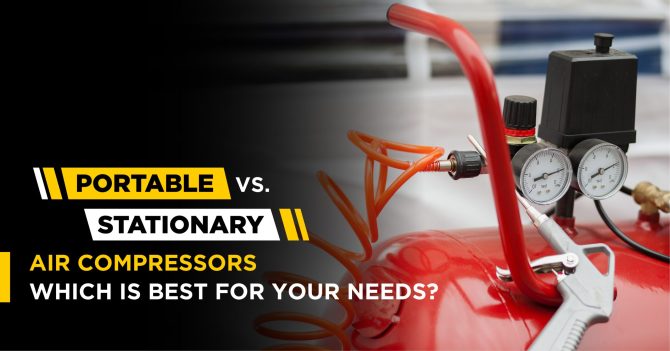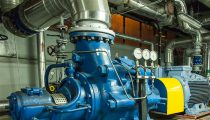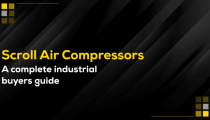Keeping necessary spare parts in stock is the wisest thing…

Portable vs. Stationary Air Compressors: Which is Best For Your Needs?
The adaptability of air compressors makes them crucial instruments in multiple domains and applications. Inflating tyres and powering pneumatic equipment are vital to streamlining operations. Beyond what initially meets the eye, there are factors to ponder when choosing between portable and stationary air compressors. Various options must be evaluated, with their unique advantages and disadvantages, before selecting the right air compressor supplier in Eastern India
Here are the reasons why:
Portability and Mobility
Portable air compressors are named for their easy mobility. They have handles or wheels so that you can move them quickly. These tools are designed to make your work easier. They provide adaptability and serve a broad diversity of people with various compressed air service needs.
In comparison, stationary air compressors are significantly bigger and immovable. Their bigger storage tanks and improved power make compressed air tools more effective for extended activities.
Power and Performance
When it comes to output, stationary air compressors excel. The increased size grants motor and tank capacities that enhance airflow and pressure potential. Their consistent and powerful air supply makes them ideal for industrial applications like manufacturing facilities or automotive repair shops.
Despite being less robust, portable air compressors are versatile enough for many purposes. These are designed for easy inflation of tyres and light to medium-duty tool use, such as brad nailers. A specification review is vital for guaranteeing that the compressor can generate enough pressure and airflow for the requisite duties.
Noise Levels
In areas where residential spaces exist, or noise levels need to be restricted, the sound factor can become a substantial issue. Stationary compressors’ larger size and soundproofing make them quieter than their portable counterparts. If noise is a top priority, stationary models are likely to appeal more.
Their compact size may contribute to their higher volume, making portable air compressors less than ideal for quiet workspaces. Although technological progress has led to the creation of quieter, portable models that can be utilised in residential workshops or job sites with less stringent noise restrictions, there can be mechanical problems later.
Maintenance and Durability
The upkeep needs of portable and stationary air compressors differ significantly. More substantial and larger in design, stationary models typically necessitate fewer maintenance intervals. With longer duty cycles, they can operate uninterruptedly for extended periods without overheating, thereby ensuring their suitability for continuous use.
The compact nature of portable air compressors can lead to more frequent maintenance requirements. Prolonged and uninterrupted use can result in overheating. These upkeep procedures, including oil changes and filter cleaning, can help extend their lifespan.
Keep Reading: Maintenance Tips Ways To Extend The Life Of Your Air Compressor
Cost Considerations
Cost is a significant factor when deciding between transportable and stationary air compressors. Transportable models are more affordable upfront due to their smaller size and less effective components. However, if you require better overall performance and capacity, the cost of a desk-bound air compressor is justified by its abilities and toughness, particularly in expert settings.
Portable vs. Stationary Air Compressors – Choosing the Ideal One.
We have already seen the features of both portable and stationary air compressors. Now the question is, What air compressor do you need to pick out for your project?
- Select the proper air compressor in keeping with the needs of your application(s).
- If you need to do small home tasks like dusting or inflating, then a portable air compressor is terrific. You can carry it without difficulty anywhere and each time you need it.
- A medium-length 30-gallon transportable air compressor is sufficient for nailing or walking effect equipment. As for the nailing task, you want to transfer the compressor from one vicinity to another.
- Again, if your purpose is to do a paint process, select an air compressor with a large air tank (at least 40 gallons). There are quite a few transportable air compressors with a 40 to 50-gallon air tank.
- However, if you need to run a series of air tools in your house storage, a stationary air compressor is the best answer. With a bigger air tank, you may get non-stop airflow. So you could easily set a number of air gears by plumbing with the compressor.
- If your operating region is a medium to large storage facility or industry, take the desk-bound one. This powerful system will ensure efficiency at the expense of sturdiness.
In a nutshell, top air compressor suppliers in Eastern India can recommend the right type and size of compressor based on a company’s specific requirements.
Deciding between a portable and a stationary air compressor depends on what you need it for—no single solution is suitable for everyone. The choice between the two depends on the tasks you will be performing and your budget constraints. Portable air compressors offer mobility and convenience, making them perfect for DIY-ers and those needing compressed air services. Stationary air compressors excel in strength, performance, and sturdiness, making them a better choice for business and heavy-responsibility packages. By carefully thinking about your necessities and priorities, you may make an informed selection that suits your needs.
pikashow apk download Affinity Designer 2.1.1 Crack google voice apk




